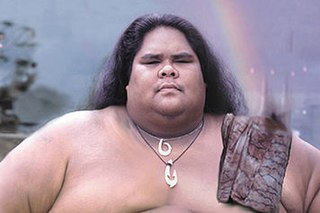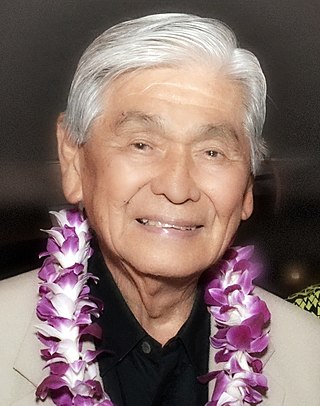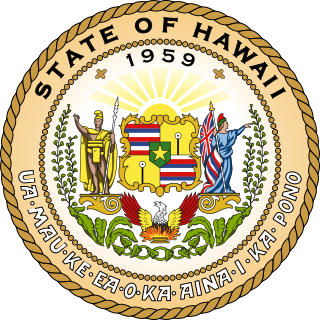Related Research Articles

Hawaii is an island state of the United States, in the Pacific Ocean about 2,000 miles (3,200 km) southwest of the U.S. mainland. It is the only state not on the North American mainland, the only state that is an archipelago, and the only state in the tropics.

Honolulu is the capital and most populous city of the U.S. state of Hawaii, which is in the Pacific Ocean. An unincorporated city, it is the county seat of the consolidated City and County of Honolulu, situated along the southeast coast of the island of Oʻahu, and is the westernmost and southernmost major U.S. city. Honolulu is Hawaii's main gateway to the world. It is also a major hub for business, finance, hospitality, and military defense in both the state and Oceania. The city is characterized by a mix of various Asian, Western, and Pacific cultures, reflected in its diverse demography, cuisine, and traditions.

Since Hawaii became a state in 1959, it has sent congressional delegations to the United States Senate and United States House of Representatives. Each state elects two senators to serve for six years. Members of the House of Representatives are elected to two-year terms, one from each of Hawaii's congressional districts. Before becoming a state, the Territory of Hawaii elected a non-voting delegate at-large to Congress from 1900 to 1958.

The United States Minor Outlying Islands is a statistical designation defined by the International Organization for Standardization's ISO 3166-1 code. The entry code is ISO 3166-2:UM. The minor outlying islands and groups of islands consist of eight United States insular areas in the Pacific Ocean and one in the Caribbean Sea.

The contiguous United States consists of the 48 adjoining U.S. states and the District of Columbia of the United States of America in central North America. The term excludes the only two non-contiguous states, which are Alaska and Hawaii, and all other offshore insular areas, such as the U.S. territories of American Samoa, Guam, the Northern Mariana Islands, Puerto Rico, and the U.S. Virgin Islands. The colloquial term "Lower 48" is also used, especially in relation to Alaska.

Israel Kaʻanoʻi Kamakawiwoʻole, also called Braddah IZ or just simply IZ, was a Native Hawaiian musician and singer. He achieved commercial success and popularity outside of Hawaii with his 1993 studio album, Facing Future. His medley of "Somewhere Over the Rainbow/What a Wonderful World" was released on his albums Ka ʻAnoʻi and Facing Future, and was subsequently featured in various media. The song has had 358 weeks on top of the World Digital Songs chart, making it the longest-leading number-one hit on any of the Billboard song charts. Kamakawiwoʻole is regarded as one of the greatest musicians from Hawaii and is the most successful musician from the state.

George Ryoichi Ariyoshi is an American lawyer and politician who served as the third governor of Hawaii from 1974 to 1986. A Democrat, he is Hawaii's longest-serving governor and the first American of Asian descent to serve as governor of a U.S. state. He assumed gubernatorial powers and duties when Governor John A. Burns was declared incapacitated in October 1973 and was elected in 1974, becoming the first Asian-American to be elected governor of a U.S. state or territory. His lengthy tenure is a record likely to remain unbroken due to term limits enacted after he left office. Ariyoshi is now considered an elder statesman of the Democratic Party of Hawaiʻi.

Territories of the United States are sub-national administrative divisions overseen by the federal government of the United States. The various American territories differ from the U.S. states and Indian reservations as they are not sovereign entities. In contrast, each state has a sovereignty separate from that of the federal government and each federally recognized Native American tribe possesses limited tribal sovereignty as a "dependent sovereign nation." Territories are classified by incorporation and whether they have an "organized" government through an organic act passed by the Congress. American territories are under American sovereignty and, consequently, may be treated as part of the United States proper in some ways and not others. Unincorporated territories in particular are not considered to be integral parts of the United States, and the Constitution of the United States applies only partially in those territories.

Hawaiʻi Volcanoes National Park is an American national park located in the U.S. state of Hawaii on the island of Hawaii. The park encompasses two active volcanoes: Kīlauea, one of the world's most active volcanoes, and Mauna Loa, the world's largest shield volcano. The park provides scientists with insight into the development of the Hawaiian Islands and access for studies of volcanism. For visitors, the park offers dramatic volcanic landscapes, glimpses of rare flora and fauna, and a view into the traditional Hawaiian culture connected to these landscapes.

Native Hawaiians are the indigenous Polynesian people of the Hawaiian Islands.

The East–West Center (EWC), or the Center for Cultural and Technical Interchange Between East and West, is an education and research organization established by the U.S. Congress in 1960 to strengthen relations and understanding among the peoples and nations of Asia, the Pacific, and the United States as part of Cold War diplomatic efforts.
Hawaii's 2nd congressional district is a congressional district in the U.S. state of Hawaii. It is represented by Jill Tokuda, who succeeded Kai Kahele after the 2022 election. The district encompasses all rural and most suburban areas of Oahu/Honolulu County, as well as the entire state outside of Oahu. It includes the counties of Kauai, Maui, Kalawao, and Hawaii. The district spans 331 miles. The most populous community entirely within the district is Hilo. Major segments of the economy include tourism, ranching, and agriculture.

The Hawaii Republican Party is the affiliate of the Republican Party (GOP) in Hawaii, headquartered in Honolulu. The party was strong during Hawaii's territorial days, but following the Hawaii Democratic Revolution of 1954 the Democratic Party came to dominate Hawaii. The party currently has little power and is the weakest state affiliate of the national Republican Party; it controls none of Hawaii's statewide or federal elected offices and has the least presence in the state legislature of any state Republican party.

The United States District Court for the District of Hawaii is the principal trial court of the United States Federal Court System in the state of Hawaii. The court's territorial jurisdiction encompasses the state of Hawaii and the territories of Midway Atoll, Wake Island, Johnston Atoll, Kingman Reef, Palmyra Atoll, Baker Island, Howland Island, and Jarvis Island; it also occasionally handles federal issues that arise in the territory of American Samoa, which has no local federal court or territorial court. It is located at the Prince Kuhio Federal Building in downtown Honolulu, fronting the Aloha Tower and Honolulu Harbor. The court hears both civil and criminal cases as a court of law and equity. A branch of the district court is the United States Bankruptcy Court which also has chambers in the federal building. The United States Court of Appeals for the Ninth Circuit has appellate jurisdiction over cases coming out of the District of Hawaii. The United States Attorney for the District of Hawaii represents the United States in all civil and criminal cases within her district.

The politics of the U.S. state of Hawaii typically take place within the framework of a Democrat-dominated government. The Democratic Party in Hawaii was formed in 1900, by supporters of Queen Liliʻuokalani. For the first half of the twentieth century, the Republican Party ruled comfortably, dominating local politics until the end of World War II. After the war, Honolulu police officer John A. Burns began organizing plantation laborers, including many Japanese Americans and Filipino Americans and built a coalition that gradually strengthened the Democratic Party in Hawaii. This culminated in the Hawaii Democratic Revolution of 1954, after which Republican political influence in the islands was greatly diminished.

The 2002 Hawaii gubernatorial election was held on November 5, 2002, to select the Governor of Hawaii. Incumbent Democratic Governor of Hawaii Ben Cayetano was term-limited and therefore could not run for re-election. Former Maui Mayor Linda Lingle, who had narrowly lost the 1998 election, was nominated once again by the Republicans while Lieutenant Governor Mazie Hirono earned the Democratic nomination in a tight race. Lingle and Hirono duked it out in a hard-fought campaign, with Hirono's campaign crippled by allegations of corruption within the Hawaii Democratic Party and many voters desiring a change. Ultimately Lingle defeated Hirono in a close election, making her the first Republican Governor of Hawaii elected since 1959 and the state's first-ever female governor. She was the first white person to be elected governor of the state since 1970. Lingle and Hirono faced off again in Hawaii’s 2012 U.S. Senate election; Hirono won that race and thus became the first female U.S. Senator in Hawaii history.

Tulsi Gabbard is an American politician, United States Army Reserve officer and political commentator, who was the U.S. representative for Hawaii's 2nd congressional district from 2013 to 2021. Gabbard was the first Samoan-American to become a voting member of Congress and also its first Hindu member. She was a candidate for the Democratic nomination in the 2020 United States presidential election, before announcing in October 2022 that she had left the Democratic Party to become an independent.
Asian Americans and Pacific Islands Americans have given fluctuating levels of support to conservative movements and political parties in the United States, particularly the Republican Party. Many Republican Party members with these origins have obtained posts as elected representatives and political appointments as office holders.
References
- ↑ "[USC02] 48 USC Ch. 3: Front Matter". uscode.house.gov. Archived from the original on October 29, 2018. Retrieved October 28, 2019.